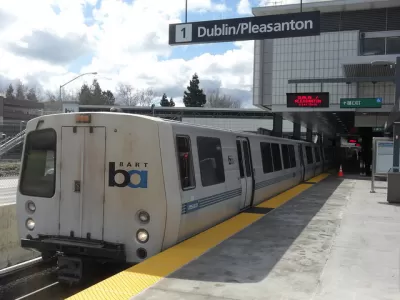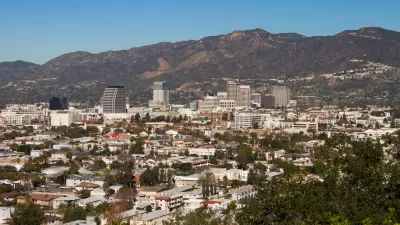Another bill under consideration by the California State Legislature would take land use control away from local agencies near transit stations. In this case, the new authority would be regional.

"Cities reluctant to OK housing on BART’s expansive parking lots and other land owned by the rail system would be forced to allow it under a new bill unveiled this week," reports Katy Murphy.
On Monday, Assemblyman David Chiu, D-San Francisco, introduced Assembly Bill 2923, along with Assemblyman Tim Grayson, D-Concord. The bill would "require BART to approve new standards for housing development that reflect the ambitious goals the system recently set. Local governments would have two years to update their zoning restrictions accordingly."
As for the goals set by BART, in 2016 the regional commuter rail system's Board of Directors set a target for 20,000 residential units to be built on BART property by 2040 [pdf]. That total is expected to contribute 12 percent of the transit oriented development goals established by Plan Bay Area.
While the bill would allow BART more control over development on BART property, allowing the priorities of the regional agency to override local obstruction of development at transit stations, the bill would have far less impact than SB 827, proposed by state senators Scott Wiener and Nancy Skinner. That bill would mandate new zoning rules (in effect: an upzoning) around transit stations regardless of property ownership and on every variety of transit line in the region.
The Non-Profit Housing Association of Northern California and the State Building & Construction Trades Council of California sponsor the bill.
FULL STORY: 20,000 new homes by BART stations? A new California zoning bill aims to speed building

Maui's Vacation Rental Debate Turns Ugly
Verbal attacks, misinformation campaigns and fistfights plague a high-stakes debate to convert thousands of vacation rentals into long-term housing.

Planetizen Federal Action Tracker
A weekly monitor of how Trump’s orders and actions are impacting planners and planning in America.

San Francisco Suspends Traffic Calming Amidst Record Deaths
Citing “a challenging fiscal landscape,” the city will cease the program on the heels of 42 traffic deaths, including 24 pedestrians.

Bend, Oregon Zoning Reforms Prioritize Small-Scale Housing
The city altered its zoning code to allow multi-family housing and eliminated parking mandates citywide.

Amtrak Cutting Jobs, Funding to High-Speed Rail
The agency plans to cut 10 percent of its workforce and has confirmed it will not fund new high-speed rail projects.

LA Denies Basic Services to Unhoused Residents
The city has repeatedly failed to respond to requests for trash pickup at encampment sites, and eliminated a program that provided mobile showers and toilets.
Urban Design for Planners 1: Software Tools
This six-course series explores essential urban design concepts using open source software and equips planners with the tools they need to participate fully in the urban design process.
Planning for Universal Design
Learn the tools for implementing Universal Design in planning regulations.
planning NEXT
Appalachian Highlands Housing Partners
Mpact (founded as Rail~Volution)
City of Camden Redevelopment Agency
City of Astoria
City of Portland
City of Laramie





























